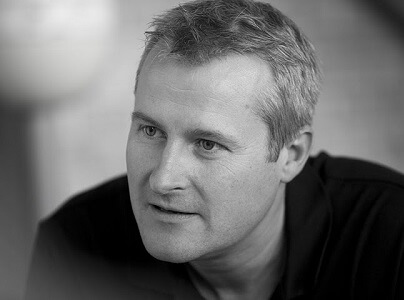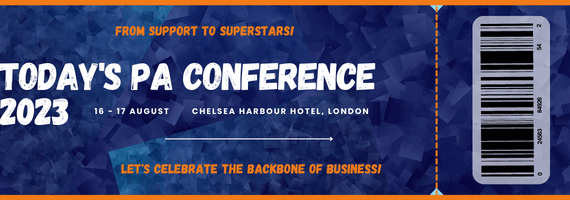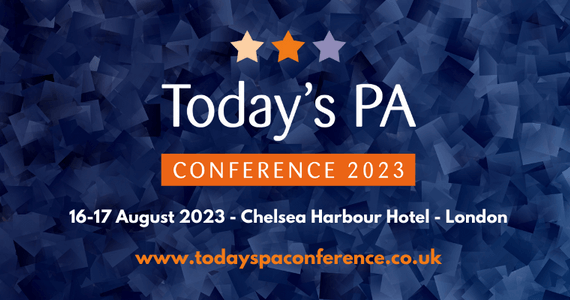Shopping cart
Your cart is empty
£0.00

David Clubb, MD of Tate Recruitment, has seen many changes in his career. Working in recruitment for 25 years, he has watched the industry change its working practices to keep pace with technology, and meet the demands of a new generation of clients and candidates.
Alongside this, he has witnessed the evolution of the traditional support roles, as clients seek skilled and enthusiastic employees who can see past their job titles, and adapt to an ever-changing business environment.
As a guest speaker at the Today’s PA Conference taking place on the 17th August in Central London, David will be sharing his experiences of the recruitment world, discussing the impact of office technology, and telling us why there is much, much more to come. In particular, he’ll show us how, as office support professionals, we can “future-proof” ourselves, and be ready for the challenges ahead!
“Yes, absolutely, the role is always changing and evolving. I liken it to watching your kids grow up. Changes happen all the time but it’s not until you take a step back that you can actually see the transformations that have taken place. In the past, it’s all been relatively gradual, with working practices changing over a period of many years.
However, at the moment, we’re going through a revolution in terms of new technology, and it’s going to hit us very quickly. It is not as incremental as it has been over the last decade or so. It will be super-fast. Imagine going straight from a manual typewriter to a top-of-the-range computer – right now, today. It’s going to be that sort of change. And it’s exciting as well as troubling.
The exponential curve of technology is just immense. Think about how things have changed across the generations. Look at the industrial revolution and mechanisation. You see these huge fundamental shifts, with people thinking, “technology and machinery will take away our jobs”. Actually, they don’t take away jobs. What they do is change the nature of the jobs.
There’s something called the Lump of Labour Fallacy (1891 Schloss). In the Industrial Revolution, workers felt guilty about using machines that they thought were taking jobs away from their colleagues. So they were thinking ,“I’m more productive, but I feel really bad because this machine is doing the work, rather than my colleague”. That was a fallacy. What they were able to do was to produce more, which then meant prices came down, which led to demand going up, and in fact more people were needed to keep pace with that demand.
What we’re going to see is automation and new technology making us more efficient in what we do. Yes, it will make us more productive, but it will change the role. Hopefully, it will also make it more interesting. That’s the theory anyway!
But other things will change, too; things that will take away the boring side of some roles! Routine tasks will become automated and could lead to more human interaction. This could be great for women as there may be a rise in roles requiring a range of soft skills. Women tend to have better soft skills than men, so there could be more opportunities for women to utilise those.
The traditional work of a PA – typing correspondence, preparing a PowerPoint presentation, for example – has been greatly affected by technology. These things are becoming so easy; they are almost intuitive for anyone. Artificial intelligence can predict what you’re going to say next, meaning you can type an email in half the time. In the past, managers might have thought, “I don’t have time to learn PowerPoint”, but not anymore. These days, many directors and managers do a lot of the tasks their PAs used to do. And in turn, the PA role is evolving.
The big danger here is in people putting their head in the sand, and thinking, “it’s not going to happen”, or, “it’s going to happen to somebody else, not me”. Pew Research in the USA showed that two-thirds of Americans think automation will replace human jobs … but 80% of them think that it will affect someone else. People just think, “it won’t be my job”.
Years ago, whenever anyone talked about artificial intelligence, we were told there was nothing to fear as there were many things it could never replace. But it’s happening already. Driving a car – that’s something they said would never happen. But it is. In medical research, they’re using algorithms and pattern recognition to diagnose diseases that would take a doctor maybe 15 or 20 years of training to recognise. It can now be done in seconds. Technology has completely changed the way people work, and you can’t afford to stick your head in the sand. You need to be thinking about how you can upskill yourself, be at the front of the queue, and be prepared for the future of work. “
“It has. It’s now much more informal. I’m from a generation that had to wear suits and ties, and when I first started work, ladies weren’t allowed to wear trousers to the office. These days, we go into work with open-necked shirts, casual trousers, even jeans at some clients’ offices. The policies and dress codes are being broken down, and you dress for the environment. Communication styles have also changed. All of this makes for a more casual, freer, and a more creative work environment. It’s certainly different from when I started, when all the Chief Executives were tucked away on the 5th floor, out of sight. Now the executives are accessible to everyone in the organisation, and both employees and execs benefit from that, as it offers more opportunities for people to shine.”
“It’s a symptom of how the role is changing. Companies are looking for business assistants, rather than PAs. They want to attract those with more than the traditional skill set. You don’t have to have a degree to be a PA, but companies now want more than just the basics.
Please don’t feel that you need to rush out and go and get a degree, but do consider how you can widen your skill set. There are NVQs and other qualifications you can take which will help increase your business knowledge, as well as your hard and soft skills, making you a much more attractive proposition to any employer.”
“We don’t see them rushing – but it’s something we’re trying to encourage. We are seeing a new generation of graduates coming into business who see no barriers to their future. They want to be seen, to make themselves known to the senior executives, and will use their degree skills to make sure they’re visible to the people at the top. Whereas one generation may see it as a PA job, and no more than that, this new generation doesn’t. To them, it’s a business assistant role. They think, “how can I make a difference in this company?”. This new generation have no ceiling; they think they can do any job – they think they can do the MD’s job!
I’m painting a very broad picture here, but the PA is normally the unsung hero in the background. Is the unsung hero really going to fight for more recognition? Sometimes it’s not in their nature to sing and shout about their skills. Yes, of course, they should be demanding more, saying “look, I can do this – and I want to do this”. They should understand the strategy of the business, too. I’ve been in a lot of boardrooms, and it’s the same in each one; you think that the senior executives have all the answers, they can see where the company is going, and know exactly what’s going to happen in the future. But they don’t always have the clarity of how to get to the vison! They’re like everybody else, going on gut feeling or relying on research and experience. Anybody who takes an interest in the organisation, its future direction, understands business principles, and wants to get involved will certainly get noticed.
We have plenty of examples of this – people in permanent or temporary roles who have just seized their moment. I was talking to someone recently who did exactly that. She started at the company as the temporary receptionist, and every day she demonstrated that she was professional, personable, always friendly and approachable, always on top of the job. The executive team noticed this, and when a vacancy came up, whose name did they think of first? Now she’s EA to the Chief Executive. She created a career for herself by taking an interest in the company, and seeing the role of receptionist as her stepping stone.”
“Recruitment is facing some immense challenges. To start with, at the moment, we’re still recruiting on old practices, looking at a candidate’s past experience, when, in reality, it bears little or no relation to what they can do in the future. As technology starts to change the nature of the traditional roles, we’ll start looking at candidates’ inherent skills through their behaviours, their interests and competencies. That means the “what are your hobbies?” question, usually at the very end of the interview, will be right at the forefront. When you’re asked, “what about your life outside work?”, tell your interviewer what they need to know. Perhaps you run a sports, social or community group? Do you run fundraising events? All those are great transferable skills for the future.
Artificial intelligence is already changing the nature of recruitment, and future employees will be found using different methods. There are now web crawlers that will go out across the internet, and skim CVs and LinkedIn profiles, anything on any website, searching for potential candidates that match an employer’s specific criteria. In a few seconds, recruiters can pull together a short list of candidates; potentially great matches that might not have even been considered previously. Making yourself visible to these artificially intelligent algorithms is going to be your next big challenge.
The recruitment industry as a whole is going through a massive change. The old high street, the traditional names that we used to see, just aren’t there any more. There isn’t that high street presence now. The way the market is being fragmented, it’s no longer economical to have branches, sometimes multiple branches, in every major city. It’s all changed now.
But it’s an exciting time, change means opportunity, you just need to embrace it.
My advice is to accept that these changes are going to happen and do some research and think about new skills you want to learn. Project management or Digital marketing will be very useful. Don’t be that person who thinks it will all happen to someone else. Think that it will happen to you – and then start to make the changes you need. Take control and be ready.”
PAul Pennant
MD & principal trainer at Today’s PA
__________________________________________________________
David will be speaking at the Today’s PA Conference on Friday 17th August 2018 at the Chelsea Harbour Hotel, London SW10. He will also be taking part in our Expert PA Panel, discussing ‘What Do Leaders Look for in their PAs?’.



Tel.: +44 (0)20 7622 2400
Email: info@todayspa.co.uk
Today's PA
52 The Warwick Building
Chelsea Bridge Wharf
366 Queenstown Road
London
SW11 8NJ
Copyright © 2024 Today's PA. All rights Reserved.
We use cookies, just to track visits to our website, we store no personal details.
ACCEPT COOKIES What are cookies?